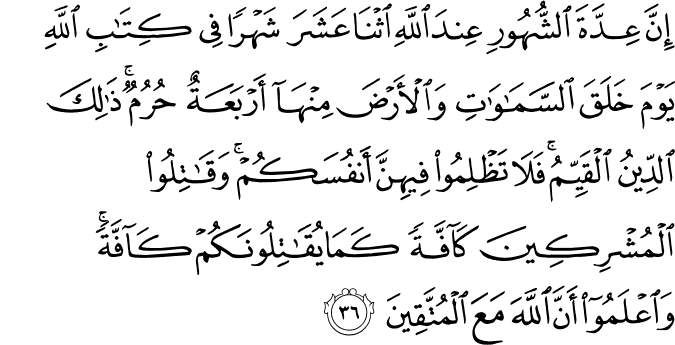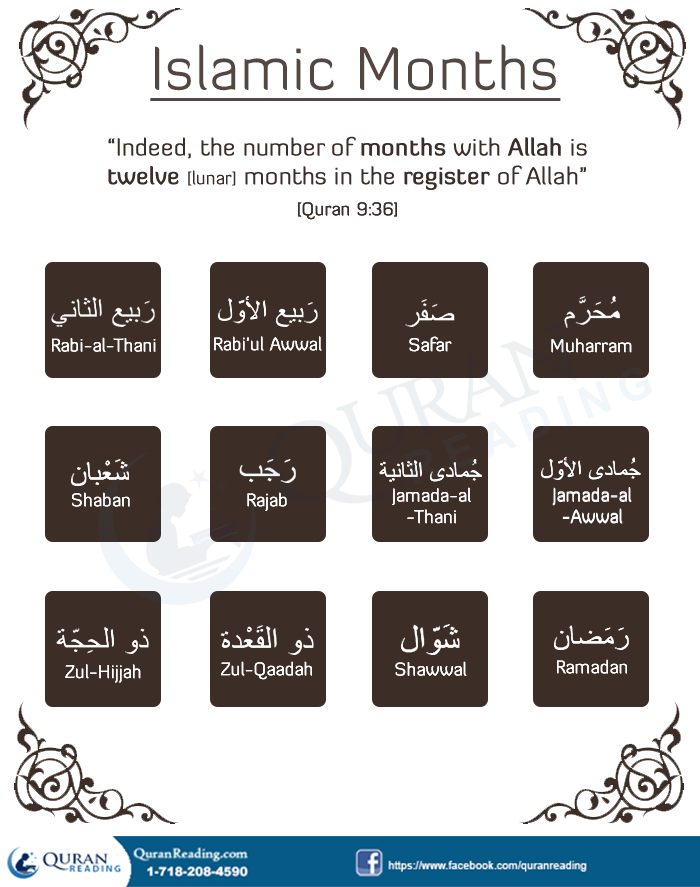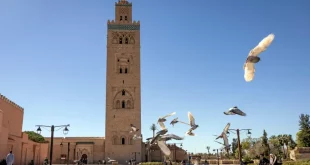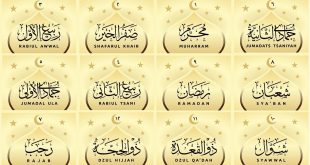Monthly calendars play a vital role in scheduling of time and important events in lives of their respective followers. There are many kinds of almanacs made from people of different religions and regions for sake of knowing about specific traditions, occasions and holidays etc. like Gregorian (Christian), Chinese and Hijri (Islamic) calendars. All of such charts are based on the shifting of the Moon and contains approximately 30 days in each month because of the Moon`s shape and movements. Islam also shares the same concept of timetable as the Almighty Lord says in the Holy Quran:

“It is He who made the sun a shining light and the moon a derived light and determined for it phases – that you may know the number of years and account [of time]. Allah has not created this except in truth. He details the signs for a people who know.” [Quran, 10: 5]
In this verse, Allah SWT has not only told us about the fact that Moon`s light is not its own, but actually resulting from the Sun, but also has made us aware of significance of both in determining years and time. All of the information that was revealed 1400 years ago has been proved right through science today.
Now coming towards the Islamic Calendar, unlike charts of other religions, it has been made only by God, the Exalted.

“Indeed, the number of months with Allah is twelve [lunar] months in the register of Allah [from] the day He created the heavens and the earth; of these, four are sacred. That is the correct religion, so do not wrong yourselves during them. And fight against the disbelievers collectively as they fight against you collectively. And know that Allah is with the righteous (who fear Him).” [Quran, 9: 36]
It means that since the beginning of time on earth and the arrival of Adam (A.S), the cycle of time period which Muslims follow today, had always been in effect. It consists of 12 months, and 4 of them are the sacred ones, about which the Holy Prophet (PBUH) is reported to have once said:
“O People! Time has gone back to how it was at the time Allah created the Heavens and the Earth. A year has twelve months, four of which are sacred, three consecutive, Thul-Qi’dah, Thul-Hijjah, Muharram, and Rajab, which comes between Jumaadaa and Sha’baan.” (Al-Bukhaari)
So, the Apostle (PBUH) of Allah has made it clear to us about those 4 sacred months which are Dhu al-Q`adah, Dhu al-Hijjah, Muharram and Rajab.

Now let us briefly take a look at the history and importance of Islamic Months one by one:
- Muharram
It is the very first month in Islamic time schedule. The literal meaning of Muharram is “Forbidden”. It has always been well thought-out as a holy period in which Arabs used to avoid fighting with each other. It consists of a particular date, i.e. 10th on which many historical happenings occurs including paving way between the Red Sea for Bani Israel by Allah Almighty and destruction of Firaon (Pharaoh), which is why the Apostle (PBUH) of God started fasting and directed other Muslims to do so and showed Jews that Musa (A.S) is dearer to us Muslims than others.
The Holy Prophet (PBUH) used to fast in this month, and is reported to have said:
“The best of fasts besides the month of Ramadhan is the fasting of Allah’s month of Muharram.” (Muslim)
Besides fasting on this day, it also landmarks the greatest Sacrifice by the Grandson of Rasulullah (PBUH), Hazrat Hussain (R.A) for sake of uplifting the Religion of Peace against unjust leader, Yazid.
- Safar
The second month, which is named so because of the word “Sifir” meaning zero or empty, as the Arabs used to empty their houses and would return back to fighting after the holy month of Muharram. It was believed in pre Islamic period that this time of the year brings mishaps and other disasters. The Holy Prophet (PBUH) was quoted by Hazrat Jabir (R.A) to have said about this fallacy:
“I have heard the Prophet saying, the descending of illness and evil superstition befalling in the month of Safar is untrue.” (Muslim)
Moreover, this is the month in which the beloved Daughter of Rasulullah (PBUH) got married with Hazrat Ali (R.A). Two battles of Abwaa and Khaibar took place on 2 A.H and 7 A.H in Safar respectively.
- Rabi ul Awwal
Third constituent of Islamic Calendar, which means the first month of spring, derived from growing of grass in it. For Muslims, it is the best time of the year because the Holy Prophet (PBUH) was born in it. He (PBUH) also migrated from Makkah to Madina in this period.
- Rabi ul Aakhir
Fourth part of Muslim year, and is named so as being the second month of spring.
- Jumad al Awwal
It was called so because of freezing of water in this phase. It is also very significant month because the Holy Prophet (PBUH) married His first Wife, Hazrat Khatija (R.A) in it. The Grandfather of Rasulullah (PBUH), Abdul Muttalib, who took his great care, also died at this time of the year.
- Jumad al Thani
It is the sixth month of Islamic Calendar named by Arabs because of winter time.
- Rajab
It is the seventh and sacred month of Muslim year whose name was derived from the Arabic word “Rajaba”, which means “to respect”, as it was always considered as a sacred time.Moreover, the Messenger (PBUH) of Allah went on the journey of M`iraj (Ascension to Heavens) and brought back the gift of Salah for Muslims with Himself.
- Sha`ban
It is the eighth month of the Islamic Calendar, whose name originated from a word “tash`aba”, which means to spread in different ways. It was called Sha`ban because the Arabs used to go in diverse directions to fight their enemies after the sacred month of Rajab. The Holy Prophet (PBUH) used to fast throughout this phase besides in Ramadan according to Hazrat A`ishah (R.A). The 15th night of Sha`ban is considered to a very blessed one, also called “Shab e Baraat”, which means “to attain Allah`s Salvation” through His remembrance, reciting the Holy Quran and praying.
- Ramadan
The derivation of the name of ninth month of Muslims came from a word “Ar-ramda” referring to tremendous heat as it used to come in such hot climate in the Arabian Peninsula at that time. The great importance of this month is that it is the period in which Muslims have to keep away from all kinds of daily needs of hunger, thirst etc. for sake of Allah SWT.

O you who have believed, decreed upon you is fasting as it was decreed upon those before you that you may become righteous. [Quran, 2: 183]
Apart from fasting, it also contains a night, 27th of Ramadan in which the Holy Quran (A great source of enlightenment) was first revealed on the Last Prophet, Hazrat Muhammad (PBUH). Besides, the very first battle in Islamic history against the disbelievers, “Ghazwa e Badr” took place during this time. The eventual victory of Makkah also occurred in this month.
10. Shawwal
It is tenth month of the Islamic Calendar, whose name gets originated fromthe Arabic word “tashawwala”, referring to scarcity of milk in female camels and this time was associated by the ancient Arabs as a bad time of the year. But Allah SWT removed all these superstitions by awarding Muslims with the gift of Eid ul Fitr after month long fasting period of Ramadan. Fasting after celebrations in this phase is also deemed very highly by Rasulullah (PBUH).
“Whoever fasts Ramadan and follows it with six days of Shawwal, it will be as if he fasted for a lifetime.” (Muslim)
Hazrat A`ishah (R.A) also got married to the Holy Prophet (PBUH) during this period. Hazrat Hussain (R.A) also got born in it. The beloved uncle of the Apostle (PBUH) of Allah, Abu Taalib (R.A), who always helped Him and other Muslims in strict times of Makkan oppressions, died in this month.
11. Dhu al-Qa’dah
It is the eleventh month, which was always a sacred time of the year and was the first one in which the Arabs avoided fighting. The battle of Khandaq took place in it. Hazrat Muhammad (PBUH) returned to Makkah foroffering Pilgrimage in 7 A.H.
12. Dhu al-Hijjah
It is the last and one of the most auspicious months of the Islamic Calendar, which is named so because the grand Pilgrimage (Hajj), which is the 5th Pillar of the Islam is performed in it. Abu Hurrairah (R.A) narrated the Holy Prophet (PBUH) once talking about Hajj as:
“Whoever performs Hajj and does not commit any obscenity or transgression shall return [free from sins] as he was on the day his mother gave birth to him.” (Al-Bukhari)
So, this month contains a holy act of Pilgrimage which results in forgiveness of all sins of a true believer.
Hence, nearly all the Islamic months have some kind of specialty engraved in them. But some of them including the four sacred months as discussed in the Holy Quran are more promising as well as other which later became prominent due to rich Muslim Rituals, obligations and traditions.
 Sri lanka Muslims Web Portal Diversity and Inclusiveness
Sri lanka Muslims Web Portal Diversity and Inclusiveness


